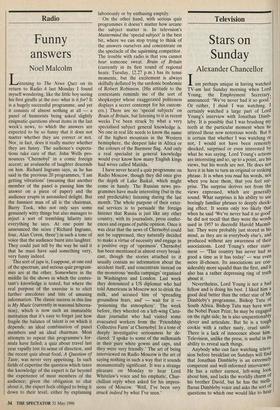Radio
Funny answers
Noel Malcolm
Listening to The News Quiz on its return to Radio 4 last Monday I found myself wondering, like the little boy seeing his first giraffe at the zoo: what is it for? It is a hugely successful programme, and yet it consists of almost nothing at all — a panel of humorists being asked slightly enigmatic questions about items in the last week's news, to which the answers are expected to be so funny that it does not matter whether they are correct or not. Nor, in fact, does it really matter whether they are funny. The audience's expecta- tions take care of that. John Wells pro- nounces 'Chernobyl' in a comic foreign accent; an avalanche of laughter descends on him. Richard Ingrams says, as he has said in the previous 20 programmes, 'I am getting vibrations' (meaning that another member of the panel is passing him the answer on a piece of paper) and the audience erupts in astonished delight. But the funniest man of all is the chairman, Barry Took, who not only says some genuinely witty things but also manages to inject a sort of trembling hilarity into everything he says. At one point he announced the score (`Richard Ingrams, four, Alan Coren, three') in such a tone of voice that the audience burst into laughter. They could just tell by the way he said it that he must have said something very, very funny indeed.
This sort of jape is, I suppose, at one end of the spectrum, and serious quiz program- mes are at the other. Somewhere in the middle lie the shows in which the contes- tant's knowledge is tested, but where the real purpose of the exercise is to elicit further anecdotes and bits of amusing information. The classic success in this line is My Music (currently in seasonal hiberna- tion), which is now such an immutable institution that it's easy to forget just how fragile the balance of talent is on which it depends: an ideal combination of panel members and an ideal chairman. Most attempts to repeat this programme's for- mula have failed; a quiz about travel last year rapidly lost its sense of direction, and the recent quiz about food, A Question of Taste, was never very appetising. In such fields of expertise the question which taxes the knowledge of the expert is far beyond the experience of most members of the audience; given the obligation to chat about it, the expert feels obliged to bring it down to their level, either by explaining laboriously or by enthusing emptily.
On the other hand, with serious quiz programmes it doesn't matter how arcane the subject matter is. In television's Mastermind the 'special subject' is the best bit, where we can stop trying to think of the answers ourselves and concentrate on the spectacle of the squirming competitor. The trouble with radio is that you cannot hear someone sweat. Brain of Britain (currently in its first round of regional heats: Tuesday, 12.27 p.m.) has its tense moments, but the excitement is always skilfully deflated by the sardonic bonhomie of Robert Robinson. (His attitude to the contestants reminds me of the sort of shopkeeper whose exaggerated politeness displays a secret contempt for his custom- ers.) There are no 'special subjects' on Brain of Britain, but listening to it in recent weeks I've been struck by what a very specialised subject general knowledge is. No one in real life needs to know the name of the highest mountain in the Western hemisphere, the deepest lake in Africa or the colours of the Burmese flag. And only a real specialist in general knowledge would ever know how many English kings had wives called Matilda.
I have never heard a quiz programme on Radio Moscow, though they did once give the depth of Lake Baikal, which might come in handy. The Russian news pro- grammes have made interesting (but in the end predictable) listening during the last month. The whole purpose of their exter- nal services is to persuade the foreign listener that Russia is just like any other country, with its journalists, press confer- ences and organs of public opinion. Once it was clear that the news of Chernobyl could not be suppressed, they naturally decided to make a virtue of necessity and engage in a positive orgy of 'openness'. Chernobyl has been mentioned in almost every broad- cast, though the stories attached to it usually contain no information about the accident itself, and concentrate instead on the monstrous 'media campaign' organised in Washington and London. Last week they denounced a US diplomat who had told Americans in Moscow not to drink the milk, and accused him of 'spreading groundless fears, and' — wait for it 'poisoning the atmosphere'. The week before, they wheeled on a left-wing Cana- dian journalist who had visited some evacuated workers from the 'Friendship Collective Farm' at Chernobyl. In a tone of deeply investigative seriousness he de- clared: 'I spoke to some of the milkmaids in their pure white gowns and caps, and they were very friendly.' The art of being interviewed on Radio Moscow is the art of saying nothing in such a way that it sounds monumentally significant. It was a strange pleasure on Monday to hear Lord Whitelaw's voice and his emphatic, Chur- chillian reply when asked for his impres- sions of Moscow. 'Well, I've been very struck indeed by what I've seen.'


























































 Previous page
Previous page